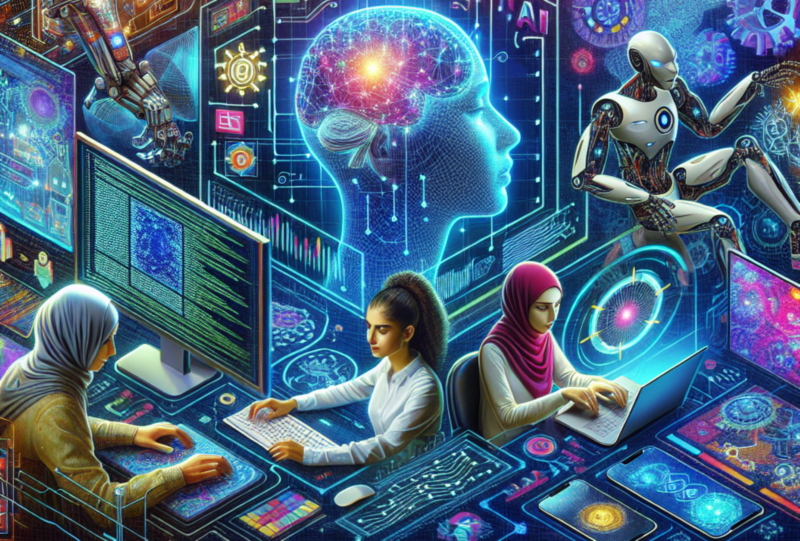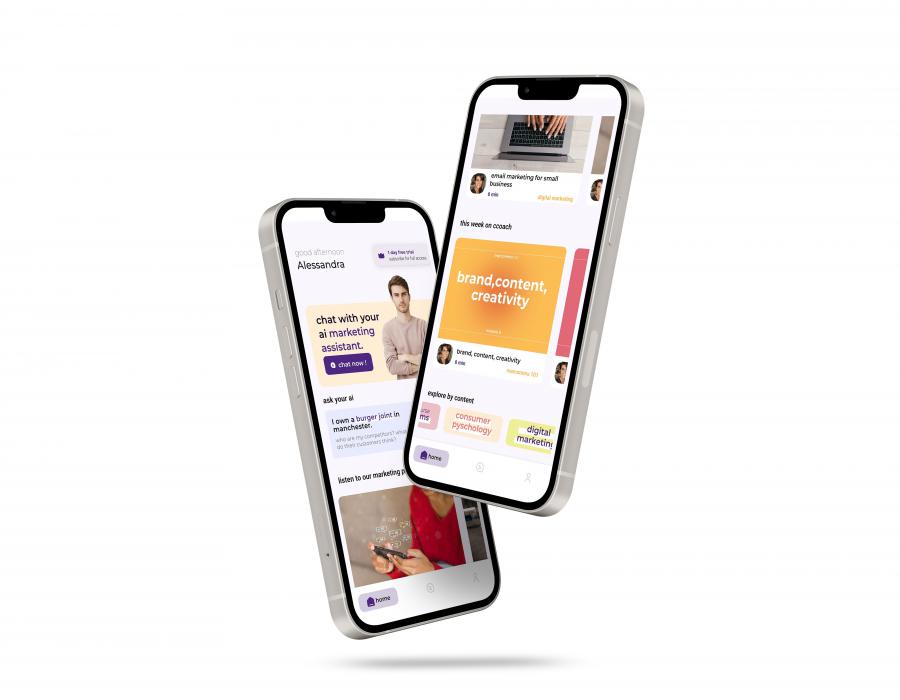When we envision the jobs that AI will transform, marketing roles often come to the forefront. AI algorithms project that only around 18% of marketing managers will witness their roles being automated, yet the perception of AI’s encroachment into the marketing sphere is widespread.
It might be particularly unsettling for women in marketing, who actually constitute most of these roles. By 2024, the proportion of men to women in marketing manager positions in North America is estimated to be 31% to 69%.
This environment produces, for women, both a unique challenge and an opportunity.
Having just emerged from the pandemic era where women were most affected by job loss, as well as being burdened by caregiving, female marketers may be especially sensitive to AI invading their workspace. Women made up only 46% of workers in the U.S. before the pandemic but accounted for 54% of overall job losses. This could make female marketers just a little nervous about their future careers, but in fact the rise of AI in marketing presents a new frontier of growth and potential for women, inspiring optimism for their future careers.
AI’s impact on the workforce, especially for women, is gaining traction. Women are not passive observers but active contributors, armed with the capacity to comprehend and adapt to these transformations. This article, drawing from personal experiences, industry insights, and expert perspectives, delves into the transformative influence of AI on the marketing profession. It offers strategies for women to survive and thrive in an AI-driven world, empowering them to chart their career trajectories.
The article also examines AI and the skills required for this new paradigm. Women can be uniquely positioned to take over in some of these areas. Here we’ll explore:
- What AI is and isn’t so that we have a clearer picture of the field we play in.
- What skills will be needed to operate effectively in the future environment.
- What women, specifically, should do in the world of marketing.
These aspects of AI should help marketers identify and rely on their value as humans.
What AI is and isn’t
Let’s start with what AI is and isn’t.
- AI is a powerful tool. It can think, learn, and act like a human. AI technology aims to recognize patterns and make decisions, and judgments like humans. It has achieved parts of this goal in some areas. Computer vision is one of the areas where AI pattern recognition excels. Today, AI applications can recognize objects and faces and classify objects based on their images.
- AI today is not about creating sentient machines or replacing humans. It’s about creating tools that augment human intelligence and capabilities. Although research is ongoing to elevate the capabilities of AI algorithms, today, AI is not a sentient machine. It cannot feel as a human does. It does, however, excel at pattern recognition and generating coherent responses. Those responses, however, lack self-awareness, subjective experiences, and an understanding of the world in a conscious sense.
- AI is not magic. Although some AI applications have been known to hallucinate (i.e., give completely off-base answers), they are built on real-world algorithms, data, and machine-learning techniques that have been around for over 75 years.
- AI has both positive and negative potential. Like all technology, its value is based on how it is used. It’s important to use AI responsibly and ethically. Just as the internet has enabled us to communicate more broadly with people, it has also enabled bad players to reek vice, greed, and sorrow in the world. However, every new technology faces the same dilemma. Swords, knives, guns, and bombs have all caused society to think about their use or misuse.
Today’s marketing organizations are finding numerous ways to incorporate AI capabilities into their processes. Marketing processes and positions most affected by AI may include:
- Data Analysts. AI can automate data collection, analysis, and reporting tasks, reducing the need for manual data manipulation and interpretation.
- Digital Ad Managers. AI-powered algorithms can optimize digital ad campaigns in real time, minimizing the need for human intervention in tasks like bid management and audience targeting.
- SEO Specialists. AI-driven tools can analyze vast amounts of data to identify trends and optimize website content for search engines, potentially reducing the need for manual keyword research and analysis.
- Content Creators. While AI can assist with content creation through tools like natural language generation, more is needed to replace human creativity and intuition fully. It does, however, streamline processes like content ideation and basic writing tasks.
- Market Researchers. AI can automate survey analysis, sentiment analysis, and trend identification, reducing the manual effort required for market research tasks.
- Email Marketers. AI can optimize email campaigns by analyzing user behavior and personalizing content, potentially reducing the need for manual segmentation and A/B testing.
- Social Media Managers. AI tools can automate social media posting, content scheduling, and audience engagement to some extent, although human oversight and creativity are still essential.
What’s important to understand with each of these areas where AI may take a position is that humans ultimately have to make decisions about AI recommendations, creations, and analyses. It may not be AI that replaces your marketing position, but it could very well be the person who understands and applies AI better than you who replaces you.
So, how do you start this journey of understanding AI and applying human traits to an AI marketing world, and what skills do you need to acquire and master?
First, let’s set the stage for AI and marketing today. Here is a high-level view of today’s marketing ethos.
- Executives demand more significant use of AI to support productivity, lower costs, and create next-generation capabilities for their stockholders.
- Marketing remains under pressure from executive teams to prove the return on marketing investment. In some industries, marketing is suffering a value crisis as chief revenue officers weigh the cost of marketing over salespeople.
- AI technology is seen as the answer and is being deployed in nearly every Marketing process, whether applicable or not. It is heavily integrated into marketing operations and is becoming more integrated into data, research, and content creation.
This environment often makes it difficult to see how “human” decision-making and intuition could be applied. But let’s look at skills that matter today and have some uniquely human components.
Dig deeper: Theresa Kushner: Spotlight on the expert
What Skills do You Need in an AI world?
Fast Company outlined five skills for the AI world:
- Social interaction. This is not just the ability to write a quick text; it also includes engaging in conversations by listening carefully to others, collaborating, and self-regulating emotions.
- Creativity. Recently, a design instructor revealed that her college students have incredible skills in manipulating design tools but lack the creativity to create original designs.
- Critical thinking. This is the ability to solve problems that don’t necessarily fit a known pattern. Logical reasoning enables us to examine AI outputs and see flaws or inconsistencies. When we apply reflective thinking and rational thought to AI outputs, we see the bigger picture, the broader ramifications or implications.
- Curiosity. AI technology can usually answer questions like “what?” and “how?”, but may have trouble always answering the “why.” Human curiosity generates the desire to know the answer to “why.” Unlike the curious two-year-old, AI will not always answer “why.” Humans must initiate questioning about reasons for actions. Asking the right question becomes even more critical in an AI world.
- Unbiased decision-making. Bias is inevitable; everyone has it. AI, however, can easily perpetuate it by creating biased solutions. Without a human involved to ferret out biased outputs or, at least, to call attention to them, AI solutions could propose unfair insurance coverage rates, prescribe inappropriate drugs to patients, or eliminate a very qualified individual from the interview cycle.
Harvard Business Review also delineated the skills employees need to work effectively with AI. HBR found that the human ability to understand context may be the most critical skill when using AI. AI does not have this ability to understand context. The authors also saw the necessity for “effective interpersonal skills, such as basic conflict resolution, communication, skills of disconnecting from emotions, and even mindfulness practices.” In addition, they identified domain expertise as essential for helping to preserve knowledge to transfer from experienced talent to developing younger talent.
Women are innately equipped with critical skills needed in today’s AI environment. They tend to be effective communicators. According to Dr. Carol Kinsey Gorman, a leadership communications expert, men and women communicate differently. This might give women may have an edge in areas like AI. Here’s the difference between the two genders:
| + | – | |
| Men | Physical presence Direct, to the point Display power |
Overly blunt Insensitive to audience Too confident in own opinion |
| Women | Read body language Good listening skills Display empathy |
Overly emotional Meander in thought Not authoritative |
Is Your Communication Style Dictated By Your Gender? (See also this article from 2024).
With these skills, women excel at building relationships. Historically, many have spent their lives creating families and building homes. These experiences help immensely when cultivating workplace relationships as well. They build trust, which is the foundation of all relationships.
With these skills, women tend to have high EI (emotional intelligence) scores. They are self-aware, can manage their emotions, are motivated, display empathy, and have social skills. These characteristics help women learn the skills to navigate complex environments, support colleagues, and manage expectations and behaviors. But, how do all these EI skills apply in the AI environment?
What should women specifically do in the AI world?
In recent interactions with women’s groups, many have expressed trepidation over the new AI environment. They question what skills they have that will be important in an AI world and whether they can overcome the obstacles of a rapidly changing work environment. They wonder how technical they need to become and how to apply ethics to the work that AI produces.
Women in marketing often fail to recognize their value, which may lead to their being discounted in the AI world. The value lies in emphasizing their positive skills and stepping up to inevitable changes in Marketing. Ironically, it could be AI that helps to save the day. Talent intelligence platforms are being developed (Gloat, Eightfold, Skyhive) to help women recognize the breadth of skills they already have and prompt them to build skills that align with new roles and ambitions. These tools can also serve as internal talent marketplaces to democratize access to opportunities and encourage skill mentorship, which is often a career accelerator.
Generative AI itself has answers for women as well. When Perplexity was asked to respond to the question: “What can women do to prepare for the AI environment?” it produced the following formula:
- Educate yourself.
- Network.
- Advocate for unbiased AI.
Advocating for AI to be more “unbiased” may require women to understand the data used in the algorithms. For example, only recently have doctors begun to recognize that women experience heart attacks differently than men. Why? Much of the earlier data collected on heart attacks was from men. When you apply an algorithm to that data, you only see patterns that fit male experiences.
Women must take simple actions in AI-infused marketing: reskill and adapt. Find your value in your marketing environment and capitalize on it. Enhance your great skills and adapt them to the new AI world. Change yourself first and then concentrate on changing the environment around you. Self-change management is key to survival. Tackle your change as if it were a project, and remember you are the product of a new world.
The transformative impact of AI on women in the workforce underscores the importance of proactive adaptation and continuous learning. By embracing change, leveraging resources, and advocating for fair and ethical AI practices, women can navigate the complexities of an AI-driven world and thrive in their careers.
Opinions expressed in this article are those of the guest author and not necessarily MarTech. Staff authors are listed here.





